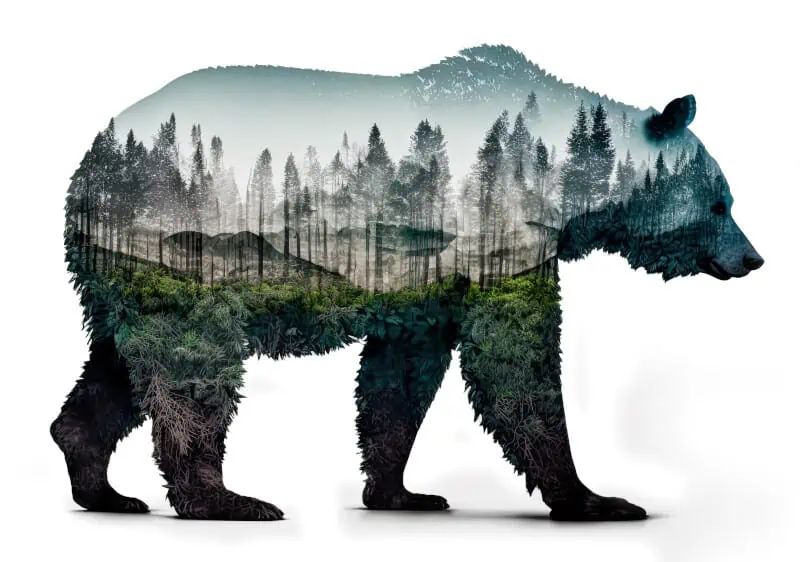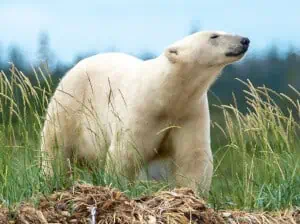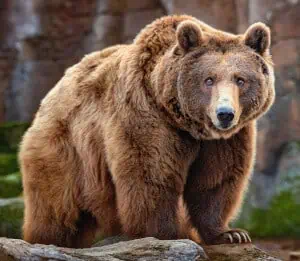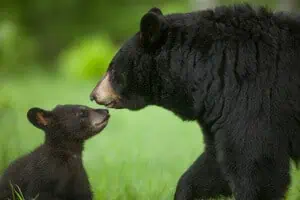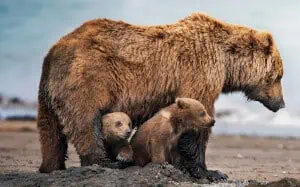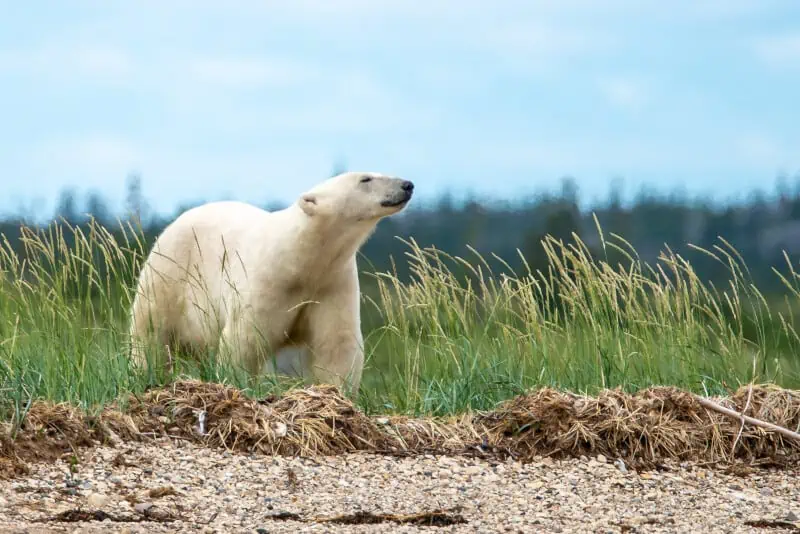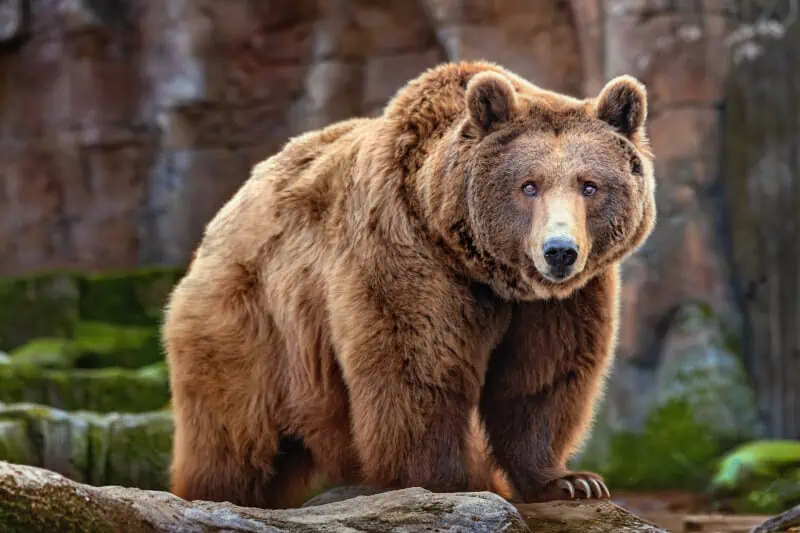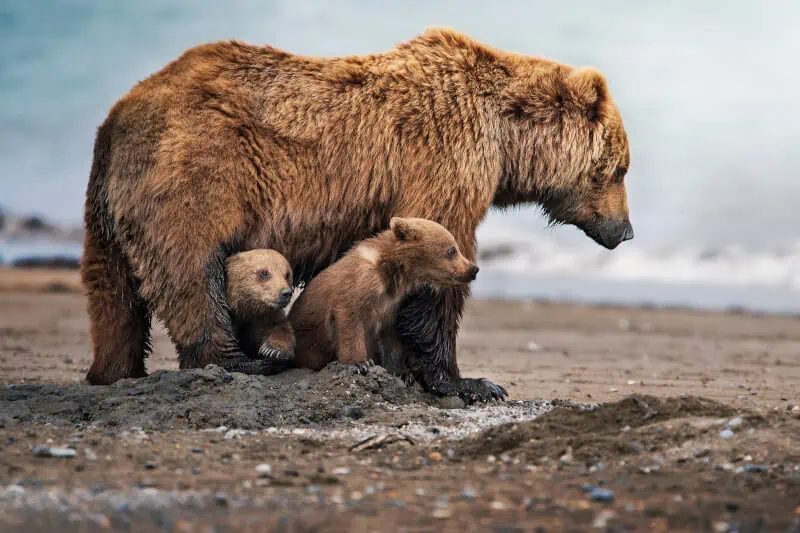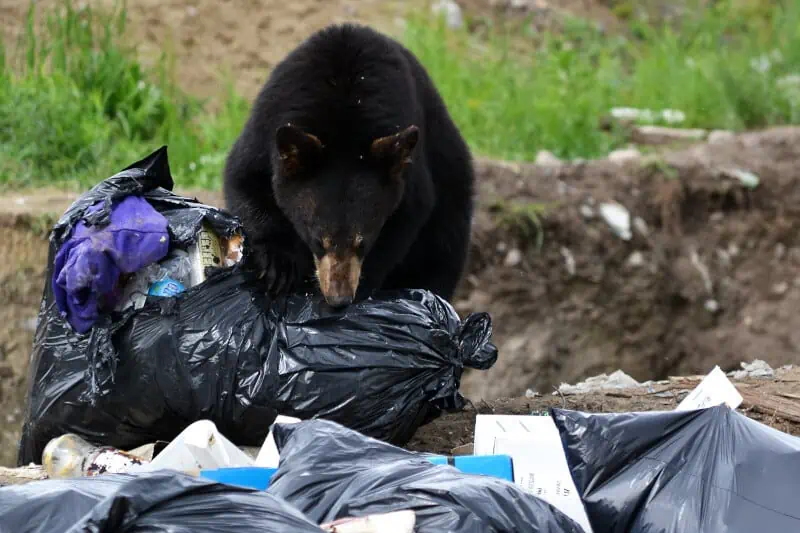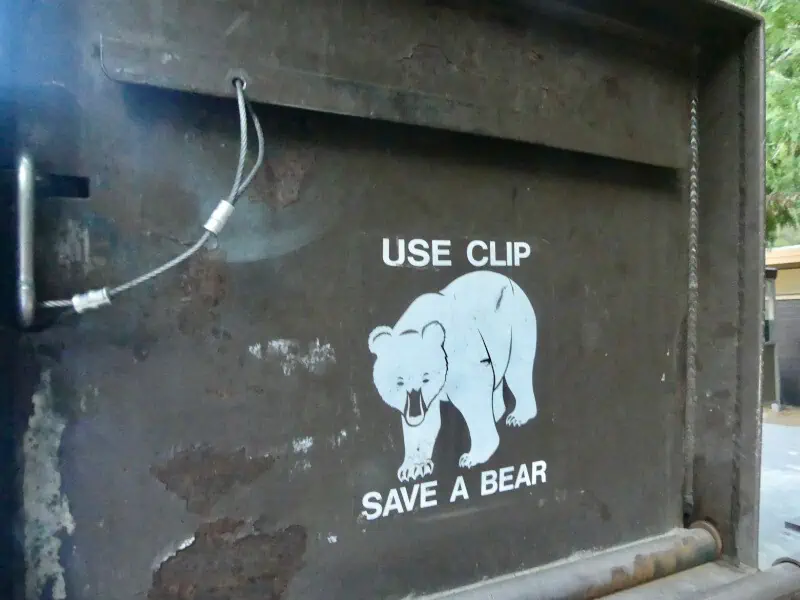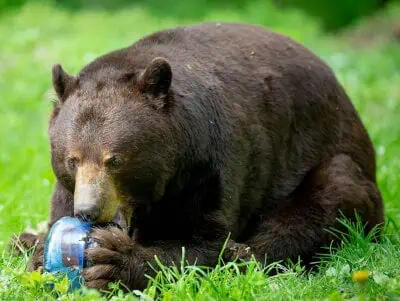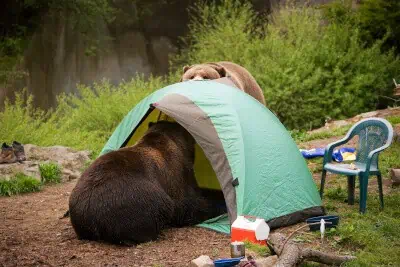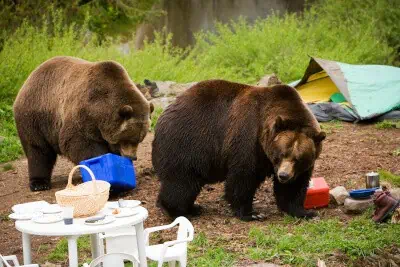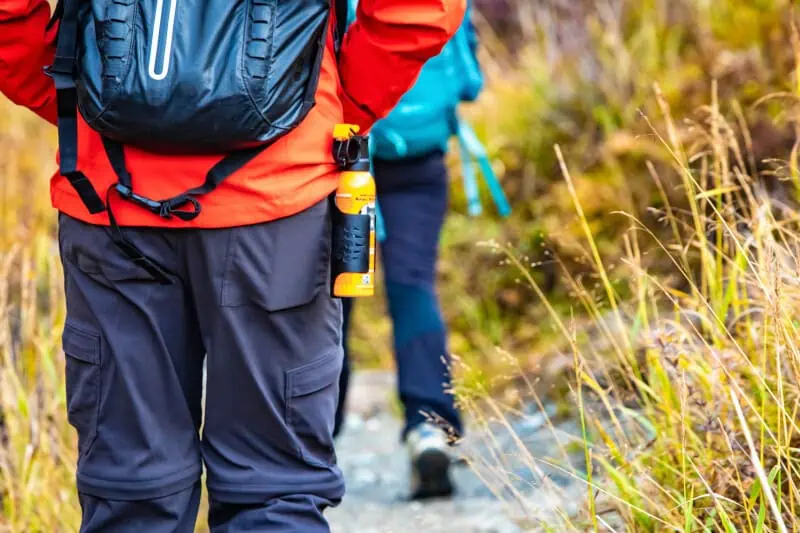Imagine hiking through the wilderness and suddenly catching a whiff of something tantalizing on the breeze. You follow the scent to its source and find yourself face-to-face with a majestic bear. It’s a thrilling encounter, but it wouldn’t have happened without the bear’s incredible sense of smell. Understanding a bear’s keen sense of smell and its role in their behavior is vital for safely coexisting with these magnificent creatures and ensuring the wellbeing of both humans and bears in the great outdoors.
Key Takeaways
- Bears possess an acute sense of smell that can detect human presence from over a mile away.
- To reduce the risk of conflicts with humans, it is important to prevent access to non-natural food sources and practice proper food storage techniques.
- By understanding a bear’s sense of smell and taking the appropriate precautions, such as carrying bear spray and following safety protocols, humans can safely coexist with bears in the wilderness.
The Science Behind How Bears Smell So Well
Bears are renowned for their extraordinary sense of smell, which is far superior to that of humans and even dogs. This incredible ability is due to the advanced nature of a bear’s olfactory system, which has evolved over millions of years to help them locate food, navigate their environment, and communicate with other bears.
Understanding the science of a bear’s sense of smell helps us appreciate their behavior and take suitable precautions in bear habitats.
Bear sense of smell
The anatomy of a bear’s nose greatly contributes to their heightened sense of smell. Their nasal cavity is larger and features a unique honeycomb structure, which allows for a higher concentration of scent receptors. This acute sense of smell is vital to their survival, as it enables them to detect food sources, identify prey, and navigate their environment from over a mile away, which is seven times better than a bloodhound.
Bears also use their sense of smell to communicate with one another through scent marking, conveying data such as gender, reproductive status, and territory boundaries. Considering their powerful sense of smell can detect human presence from afar, it’s highly recommended to carry bear spray when in bear habitats.
How Weather Conditions Affect a Bears Sense of Smell
Weather conditions can considerably affect a bear’s sense of smell. In warmer temperatures and higher wind speeds, odor molecules become more airborne, thus enhancing a bear’s sense of smell. However, rapid winds can make it difficult for bears to pinpoint the source of a smell, thus diminishing their ability to forage effectively.
Humidity can also enhance a bear’s sense of smell, as moisture helps propagate scents over a broader range, enabling bears to detect odors from a farther distance. Being aware of these factors can help you better understand how to stay safe in bear country.
Bear sense of smell vs dog
With a sense of smell that is approximately seven times greater than that of a bloodhound, bears possess the most refined sense of smell among animals. Their olfactory lobes are larger, and their snouts contain more scent receptors than dogs, allowing them to smell up to 100 times better than a canine. This exceptional olfactory capability is critical for survival, as it helps them locate food sources, identify predators, and communicate with other bears through scent marking.
Can bears smell wifi?
Although there is no evidence to suggest that bears can smell Wi-Fi signals, research has shown that they are capable of detecting electromagnetic fields. One study determined that polar bears are capable of concurrently monitoring magnetic field fluctuations and imaging the aurora at various UV wavelengths. Additionally, another study identified a molecule in the eyes of canines, bears, and orangutans with the capacity to sense magnetic fields.
How Far Different Bears Can Smell Food?
The distance at which different bear species can smell food is astounding. With their exceptional olfactory capabilities, the following bear species can all detect food from miles away:
| Bear Type | Smell Distance |
| Polar Bear
|
40 miles |
| Brown Bear
|
20 miles |
| Black Bear
|
18-20 miles |
| Grizzly Bear
|
20 miles |
| Giant Panda
|
7-10 miles |
Source: NPS
By comparing the smelling abilities of these different bear species, we can better understand their behavior and develop strategies for staying safe in bear country.
How far can a polar bear smell?
Polar bears, the largest land carnivores, possess an extraordinarily acute sense of smell, which is vital for their survival in the harsh Arctic environment. This sense of smell is crucial for locating food, tracking prey, and detecting seal breathing holes in the ice.
Finding Food and Tracking Prey
- Locating Seals: Seals are the primary food source for polar bears, and their sense of smell is key to finding them. Polar bears can detect the scent of a seal on the ice from nearly a mile away and up to three feet under compacted snow. This ability is essential for hunting, as seals provide the high-fat diet necessary for their survival in the cold Arctic conditions.
- Detecting Seal Breathing Holes: Seals maintain breathing holes in the ice to access the air when they are swimming under the frozen surface. Polar bears use their keen sense of smell to locate these breathing holes. They can smell the seals’ breath, which helps them identify active holes where they can wait for seals to emerge.
- Tracking Seal Birthing Dens: In the spring, polar bears also hunt for seal pups in their birthing dens beneath the snow. Their ability to smell these dens, often covered by snow and ice, allows them to target a valuable and otherwise well-concealed food source.
Adaptation to Arctic Environment
- Long-Distance Tracking: In the vast and visually obstructive environment of the Arctic, where food sources can be scarce and spread out, the ability to track scents as far away as 40 miles gives polar bears a significant survival advantage.
- Seasonal Hunting Strategies: During different seasons, polar bears adjust their hunting strategies based on the availability of seals and the condition of the ice. Their sense of smell helps them adapt to these changes, whether it involves detecting open leads in the ice where seals might surface or locating haul-out sites where seals rest.
Implications for Climate Change
- Impact of Melting Sea Ice: As climate change leads to the melting of sea ice, the traditional hunting grounds of polar bears are affected. This impacts their ability to use their sense of smell effectively, as the changing ice conditions alter seal behavior and accessibility.
A polar bear’s exceptional sense of smell is a key adaptation that has enabled it to become a top predator in the Arctic. It is crucial for hunting seals, their primary prey, and for navigating the challenging and often unpredictable environment of the Arctic. However, the ongoing changes in their habitat due to global warming pose significant challenges to their reliance on this sense for survival.
How far can a brown bear smell?
Brown bears are not only incredibly fast but they also have an extraordinarily powerful sense of smell, which is among the strongest of any animal on land. Here are some key aspects of their olfactory capabilities:
- Sensitivity and Range: Brown bears can detect odors over extremely long distances. Some studies suggest that under the right conditions, they can smell food, cubs, a potential mate, or danger from up to 20 miles away. This sense of smell is far superior to that of humans and is even more acute than that of dogs in some cases.
- Importance in Foraging: Their sense of smell is crucial for locating food. Brown bears are omnivores and have a varied diet, including fish, small mammals, carrion, insects, nuts, and berries. Their ability to smell food from a distance is especially important for finding carcasses or detecting spawning fish.
- Communication and Social Interaction: Scent marking is a common behavior in brown bears. They rub their bodies against trees and other objects to leave their scent, which can convey information about their size, sex, and reproductive status. This is particularly important during the mating season and in establishing territorial boundaries.
- Navigation and Safety: Brown bears use their sense of smell to navigate their environment, find denning sites, avoid predators or other dangerous situations, and potentially to locate other bears. This is especially important for mother bears in keeping track of their cubs.
- Seasonal Variations: The reliance on their sense of smell may vary seasonally. For instance, during salmon runs, their acute sense of smell leads them to rivers and streams where fish are abundant. In contrast, in the spring or fall, they might rely more on their sense of smell to find berries or nuts.
Overall, the brown bear’s sense of smell is a key adaptation that supports their survival and success in a wide range of habitats. It plays a critical role in their ability to find food, communicate with other bears, and navigate their often vast territories.
How far can a black bear smell?
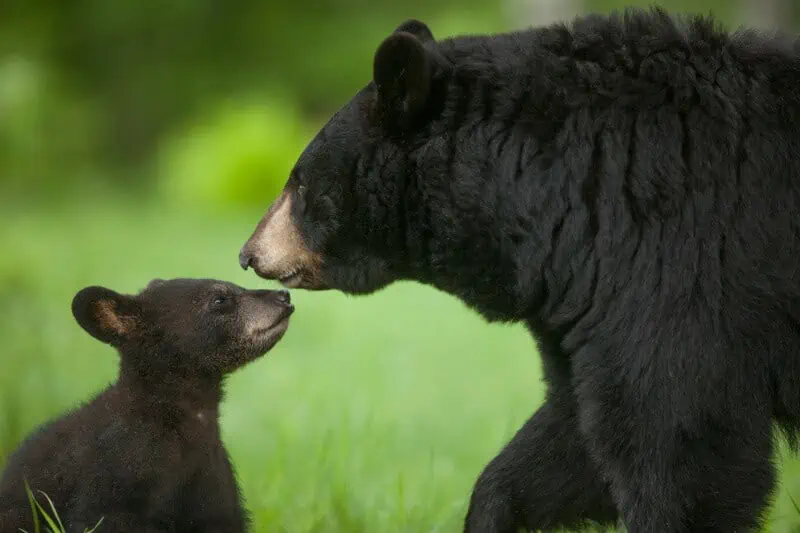
Black bears, like their brown bear cousins, possess an exceptionally acute sense of smell that is central to their survival and behavior, particularly in finding food.
- Superior Sensitivity: Black bears have one of the keenest senses of smell in the animal kingdom. Their olfactory senses are significantly better than those of humans and are thought to be on par with, or even surpass, those of dogs. This heightened sense of smell allows them to detect food sources from 18-20 miles away.
- Diverse Diet Detection: Black bears are omnivores with a varied diet that includes fruits, nuts, berries, insects, fish, and small mammals. Their ability to smell food from great distances is crucial in locating these diverse food sources, especially in dense forests or expansive wilderness areas where visual cues are limited.
- Foraging Efficiency: In many habitats, black bears rely heavily on their sense of smell to find food efficiently. For example, they can smell a carcass in the forest, detect fruits or nuts even if they are hidden by foliage, and locate insects like ants or bees within trees or underground.
- Seasonal Food Sources: The sense of smell in black bears is particularly important for finding seasonal food sources. For instance, in the spring and early summer, they may rely on their nose to find emerging vegetation and carrion left over from winter. In the fall, their sense of smell helps them in locating calorie-rich nuts and fruits to build fat reserves for hibernation.
- Hibernation and Pre-Hibernation Foraging: As black bears prepare for hibernation, their reliance on a keen sense of smell increases. They need to consume large quantities of food to build up fat. Their ability to find and consume as many calories as possible is crucial for survival during the months of hibernation.
The black bear’s sense of smell is a critical adaptation for survival, aiding significantly in their ability to find a diverse array of food sources across the changing seasons. This sense not only guides their daily foraging activities but also plays a vital role in their overall health and ability to prepare for periods of dormancy like hibernation.
How far can a grizzly bear smell?
Grizzly bears, a subspecies of brown bears, have a highly developed sense of smell that is instrumental in their ability to find food. This extraordinary olfactory ability, however, can also pose risks to human-bear encounters, especially in areas where human activities overlap with bear habitats.
Finding Food
- Locating Diverse Food Sources: Grizzlies are omnivorous, with a diet ranging from berries, nuts, roots, and leaves to fish, mammals, and carrion. Their keen sense of smell enables them to locate these food sources over great distances, sometimes as far as twenty miles away. This is particularly important in the vast and varied landscapes they inhabit.
- Seasonal Foraging: Grizzlies need to consume large amounts of food, especially before hibernation. Their sense of smell guides them to seasonally abundant foods, like salmon runs and berry patches. They can detect these high-calorie food sources even when they are not immediately visible, like fish underwater or fruits hidden by foliage.
- Detecting Carrion: Their ability to smell carrion (dead animals) is a critical survival skill, especially in early spring when other food sources are scarce. This sense helps them scavenge for leftovers from other predators or find animals that have died during winter.
Risk to Humans
- Attraction to Human Foods and Garbage: The powerful smell sense of grizzlies can become a danger when they are attracted to human foods, garbage, or other scented items (like toiletries or pet food). Such attractants can draw bears into campsites, backyards, or other areas frequented by humans, increasing the likelihood of encounters.
- Human-Bear Conflicts: When grizzly bears associate humans with easy food sources due to improper food storage or disposal, it can lead to increased human-bear conflicts. These bears may lose their natural wariness of humans and become more bold or aggressive in seeking out human foods, leading to dangerous interactions.
- Safety Precautions: In areas where grizzlies are present, it’s crucial for people to manage food and garbage responsibly. Using bear-proof containers, properly storing food, and disposing of waste in bear-proof bins are essential measures to prevent attracting bears.
- Avoidance and Awareness: Hikers and campers in grizzly territory are advised to be bear-aware: making noise to avoid surprise encounters, carrying bear spray, and being vigilant about their surroundings. Understanding and respecting the bear’s reliance on smell can help people minimize risky encounters.
While the grizzly bear’s highly developed sense of smell is key to its survival and ability to find diverse food sources, it also presents challenges in terms of human safety and wildlife management. Educating people about bear-safe practices and maintaining a respectful distance from wildlife are essential in areas where humans and grizzly bears coexist.
How far can a panda bear smell?

Pandas, known for their distinctive black-and-white fur, have a well-developed sense of smell, which plays a crucial role in their lives, particularly in communication and reproduction.
- Communication: Pandas use their sense of smell to communicate with each other. They can identify individual pandas, their gender, and reproductive status through scent marking. Pandas leave scent marks on trees, rocks, and other surfaces, which convey messages to other pandas in the area. This is particularly important as pandas are generally solitary animals.
- Reproduction: The sense of smell is vital for reproduction in pandas. Female pandas secrete special scents when they are ready to mate, which attract males. These scents can help males locate females during the breeding season. Males also use scent marking to demonstrate their presence and possibly to show dominance, which may be a factor in attracting females.
- Foraging: While pandas are primarily known for eating bamboo, they do have a varied diet that also includes other plants, and occasionally meat. Their sense of smell helps them locate food, especially when foraging for bamboo or other vegetation.
- Spatial Orientation: Like many animals, pandas also use their sense of smell for spatial orientation within their habitat. It helps them navigate their environment, avoid predators, and potentially locate other pandas.
The sense of smell is a key sensory tool for pandas, aiding in communication, reproduction, foraging, and navigation. Despite their peaceful and somewhat solitary nature, pandas have evolved a sophisticated olfactory system to adapt to their environment and lifestyle.
Scents and Smells That Attract Bears
Bears are naturally curious animals, and their keen sense of smell can lead them to investigate a variety of scents in search of food. Understanding the smells that attract bears, including food and human-related odors, helps us take suitable precautions to minimize bear encounters and ensure the safety of both humans and bears in the wilderness.
What Is Food Conditioning?
Food conditioning occurs when bears develop an association between humans and food, leading to potential conflicts. This phenomenon is caused by frequent access to human-provided foods, such as garbage or leftover food, which can lead to the development of dependent behavior. Food conditioning can result in bears becoming more aggressive in their pursuit of food, posing a threat to human safety and causing property damage.
The Difference Between Food Conditioning and Habituation
While food conditioning involves bears learning to obtain food through specific actions, habituation involves bears becoming accustomed to the presence of humans or human activities without expecting food rewards. Habituation is when bears become desensitized to the presence of humans, while food conditioning is when they begin to associate humans with food; both can lead to hazardous circumstances.
Bears accessing non-natural food sources, such as human food, trash, or livestock, are more likely to become food conditioned. Hence, preventing bears from accessing these foods is paramount to avoid food conditioning and potential conflicts with humans.
Can bears smell food in cars?
Bears can potentially smell food in cars, so proper food storage is essential to avoid attracting bears to your vehicle. This includes using odor-proof bags or containers, storing food in airtight containers, and keeping food and trash out of sight. Additionally, it is important to clean up any spills or crumbs in your car that may emit food odors.

Human scented products
Non-food items like scented candles, deodorants, lotions, soaps, and even toothpaste can attract bears. Bears are curious and may investigate any unfamiliar scents.
What does a bear smell like?
Bears typically have a fresh or earthy smell, and they usually don’t smell bad. Their natural habitat and diet contribute to their distinct aroma, which can vary among different bear species. For example, black bears have a pleasant and grassy scent, while grizzly bears have a unique musky odor.
Familiarizing yourself with the smells of bears in your area helps you better recognize their presence and take suitable precautions to avoid encounters.
Useful Tips For Keeping Bears Away
Taking suitable precautions and following best practices for keeping bears away from your campsite is essential for safe coexistence with bears in their natural habitat. By understanding the factors that attract bears and implementing strategies to minimize these attractants, we can reduce the risk of bear encounters and ensure the safety of both humans and bears in the wilderness.
Protecting Food From Bears
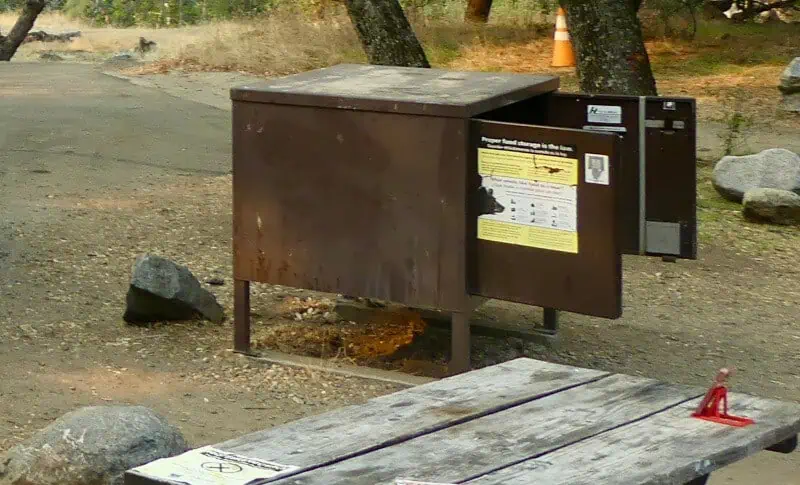
Proper food storage is critical to protect your food from bears and prevent them from becoming food-conditioned. This includes using odor-proof bags, bear canisters, and hanging food bags from a tree or bear pole. Additionally, it is important to clean up all cooking utensils and store them with your food to minimize odors that may attract bears.
Following these best practices helps keep bears away from your campsite, protecting both you and the bears.
Odor-proof plastic bags
Using odor-proof plastic bags effectively minimizes smells that attract bears. These bags feature a hermetic seal that renders them airtight, waterproof, and odor-proof, helping to contain food odors before they can escape. While odor-proof bags may not completely block out all smells, they can significantly reduce the scent of food and other attractants, making it more difficult for bears to detect your presence.
Always carry bear spray, such as a counter assault bear product, to protect yourself in case of an encounter when venturing into bear habitats.
Bear canister
A bear canister is a vital equipment for safely storing food and other scented items in bear habitats. These hard-sided containers feature locking lids that are designed to be bear-resistant and can be used to store food, toiletries, and trash. Although bears may still be able to smell food in a bear canister, the sturdy design and locking lid make it difficult for bears to access the contents and develop a taste for human food.
Camp at least 100 yards away from food
Setting up camp at least 100 yards away from your food storage area is an important precaution to take in bear country. This distance helps to minimize the chances of bears being attracted to your campsite due to the smell of food and provides a buffer zone between you and any curious bears.
Keeping your campsite a safe distance away from your food storage area reduces the likelihood of bear encounters and potentially dangerous situations.
Don’t sleep in clothes you cooked in
Avoid sleeping in clothes with food smells, as the scent can attract bears to your sleeping area. Instead, change into clean clothes before going to bed and store your cooking clothes with your food and trash in a secure location.
By participating in the “be bear aware campaign,” you can take this simple precaution to help reduce the risk of bear encounters and ensure a safer camping experience.
Make Noise
Making noise while hiking or camping in bear habitats can alert bears to your presence, giving them the chance to move away before you get too close. Bears have a sharp sense of hearing and can detect sounds from a distance, so talking loudly, clapping, or using a whistle can help to prevent surprising a bear and triggering a defensive reaction.
Always carry bear spray to protect yourself in case of unexpected encounters when in bear habitats.
Keep Your Campsite Clean
Maintaining a clean campsite is vital to minimize bear attractants and reduce bear encounter risks. This includes properly storing food and trash, cleaning up all cooking utensils and dishes, and disposing of waste in a secure location.
Keeping your campsite clean and free of food odors helps prevent bears from being attracted to the area, ensuring a safer camping experience.
Stay Calm
In case of a bear encounter, staying calm and following suitable safety guidelines is important. This includes:
- Speaking in a calm and firm voice
- Avoiding sudden movements
- Slowly retreating without turning your back on the bear
- If the bear approaches or follows you, stand your ground and use bear spray if necessary.
Remaining calm and composed during a bear encounter helps reduce the risk of a dangerous situation and protects both you and the bear.
Keep Your Dog Under Control
Keeping your dog under control is essential when in bear country, as their quick movements and barking can provoke bears and potentially cause them to pursue. Always keep your dog on a leash and never allow them to approach or harass bears.
If your dog provokes an aggressive bear, prioritizing your safety and following suitable guidelines to avoid a dangerous situation is critical.
Know What Kinds of Bear are in the Area
Being aware of the types of bears in the area and their behavior patterns is important for staying safe in bear country. Familiarizing yourself with the local bear population can help you better understand their habits and take appropriate precautions to avoid encounters.
Knowing the kinds of bears in the area prepares you better and increases your confidence when venturing into their habitat.
Stay Out of a Bears Way
Giving bears space and avoiding getting in their way is essential for maintaining a safe distance and reducing the risk of bear encounters. When hiking or camping in bear country, be mindful of your surroundings and give bears the opportunity to move away before you get too close.
Staying out of a bear’s way helps ensure a safer experience for both you and the bear.
Get Rid of Trash
Proper trash disposal is crucial to avoid attracting bears to your campsite. Here are some tips to follow:
- Use odor-proof bags or containers to store your trash.
- Store your trash in a secure location, such as a bear-resistant container or a locked vehicle.
- Pack out all garbage and food scraps when leaving the campsite.
By following these guidelines provided by the Interagency Grizzly Bear Committee, you can help keep bears away from your campsite and protect both yourself and the bears.
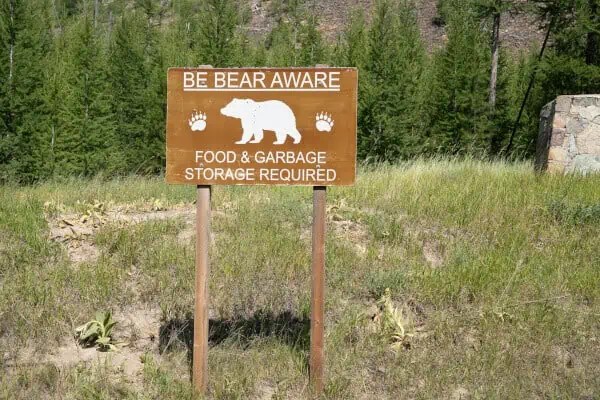
Getting rid of trash and keeping your campsite clean helps prevent bears from being attracted to the area, ensuring a safer camping experience.
Have Bear Spray
Carrying bear spray is a vital safety measure when venturing into bear habitats. An actual bear spray canister is a pressurized container containing a highly concentrated pepper spray that can be used to deter bears in the event of a hazardous encounter. It provides the user with the ability to remain at a greater distance from the bear while still being able to defend themselves using bear spray canisters, such as the counter assault bear spray. Knowing how to treat bear spray exposure is also essential for ensuring safety in the outdoors.
Always carry bear spray and know its effective usage when in bear habitats.
Frequently Asked Questions
These are some of the most frequently asked questions we get from our readers about a bears sense of smell.
Can bears smell food inside a car or a sealed container?
Answer: Yes, bears can smell food even inside cars or sealed containers. Their acute sense of smell can detect even faint odors, which is why it’s important to store food in bear-proof containers.
What types of food smells are most likely to attract bears?
Answer: Bears are attracted to a wide range of food smells, including meats, fish, fruits, sweets, and cooked meals. Even non-food items with strong odors, like scented candles or toiletries, can attract bears.
Do bears have a better sense of smell than dogs?
Answer: Bears have one of the best senses of smell in the animal kingdom, and it is believed to be even better than that of dogs, particularly in species like black bears.
How does a bear’s sense of smell contribute to its survival?
Answer: A bear’s sense of smell is crucial for finding food, especially in dense forests or during different seasons. It also aids in avoiding predators, locating mates, and identifying territories.
Can a bear’s sense of smell lead to conflicts with humans?
Answer: Yes, bears attracted by the smell of human food or garbage can wander into human settlements, leading to potential conflicts. Proper food storage and garbage disposal are essential in bear-inhabited areas.
How do bears use their sense of smell during different seasons?
Answer: Bears rely on their sense of smell to find food sources that vary with the seasons, such as fresh vegetation in spring, fish in summer, and nuts or fruits in fall.
Can bears smell fear in humans?
Answer: There’s no scientific evidence that bears can smell fear in humans. However, they are very sensitive to changes in human behavior and can react to fear-induced actions.
What precautions should be taken to avoid attracting bears with smells?
Answer: Store food and garbage in bear-proof containers, clean cooking equipment thoroughly, avoid leaving food or trash outdoors, and minimize the use of scented products in bear territories.
Does a bear’s sense of smell diminish with age?
Answer: Like many animals, a bear’s sense of smell may slightly diminish with age, but it generally remains highly effective throughout their lifetime for essential activities like foraging and mating.
Summary
To sum up, bears have an incredible sense of smell that plays a significant role in their behavior and survival. By understanding the science behind their olfactory abilities and implementing strategies to minimize attractants, we can coexist with bears and enjoy the great outdoors while ensuring the safety of both humans and bears.

